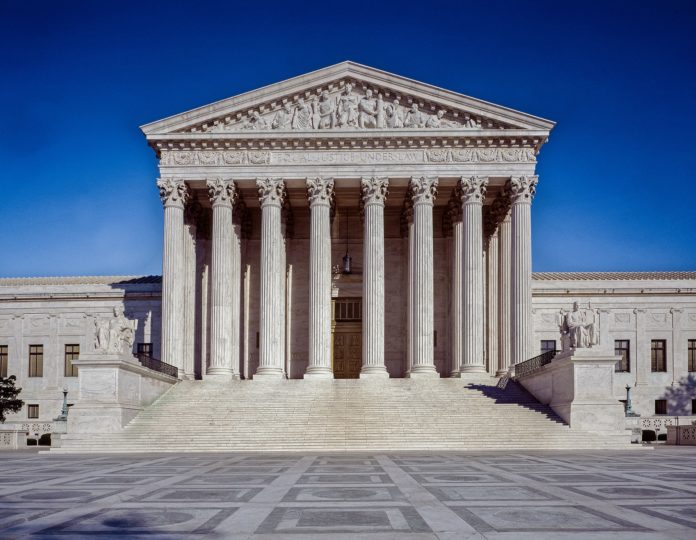
Editor’s Note: Law Week Colorado edits court opinion summaries for style and, when necessary, length.
President Donald Trump has invoked the Alien Enemies Act to remove Venezuelan nationals who are members of Tren de Aragua, or TdA, a designated foreign terrorist organization. Applicants are two detainees identified as members of TdA and a putative class of similarly situated detainees in the Northern District of Texas. All of the alleged TdA members in the putative class are currently being held in U.S. detention facilities. In the application before the U.S. Supreme Court, the detainees sought injunctive relief against summary removal under the AEA.
At 12:52 a.m. Eastern time, the high court ordered the government — in light of all these circumstances — “not to remove any member of the putative class of detainees” in order to preserve its jurisdiction to consider the application. The Supreme Court invited the government to respond to that application after the 5th Circuit Court of Appeals ruled. The 5th Circuit dismissed the detainees’ appeal for lack of jurisdiction and denied their motion for injunction pending appeal as premature, on the ground that the detainees “gave the [district] court only 42 minutes to act.”
The Supreme Court construed the application as a petition for writ of certiorari from the decision of the 5th Circuit. It granted the petition as well as the application for injunction pending further proceedings, vacated the judgment of the 5th Circuit and remanded for further proceedings.
In its order, the court said it’s long held that “no person shall be” removed from the U.S. “without opportunity, at some time, to be heard.” The high court noted that due process requires notice that is “reasonably calculated, under all the circumstances, to apprise interested parties” and that “afford[s] a reasonable time . . . to make [an] appearance.”
In J.G.G. v. Trump, the court noted it explained — with all nine justices agreeing — that AEA detainees must receive notice that they are subject to removal under the act within a reasonable time and in such a manner as will allow them to actually seek habeas relief before removal. In
order to actually seek habeas relief, the court explained that a detainee must have sufficient time and information to reasonably be able to contact counsel, file a petition and pursue appropriate relief.
The Supreme Court found the 5th Circuit erred in dismissing the detainees’ appeal for lack of jurisdiction. Appellate courts have jurisdiction to review interlocutory orders that have the practical effect of refusing an injunction. A district court’s inaction in the face of extreme urgency and a high risk of serious, or even irreparable, consequences may have the effect of refusing an injunction. Here the district court’s inaction — not for 42 minutes but for 14 hours and 28 minutes — had the practical effect of refusing an injunction to detainees facing an imminent threat of severe, irreparable harm, the high court said.
The judgment of the 5th Circuit was vacated, and the case was remanded back to the 5th Circuit. In resolving the detainees’ appeal, the Supreme Court said the Fifth Circuit should address all the normal preliminary injunction factors, including likelihood of success on the merits, as to the named plaintiffs’ underlying habeas claims that the AEA does not authorize their removal pursuant to the president’s March 14 proclamation, and the issue of what notice is due, as to the putative class’s due process claims against summary removal.
The high court ordered that the government is enjoined from removing the named plaintiffs or putative class members in this action under the AEA pending order by the 5th Circuit and disposition of the petition for a writ of certiorari, if such writ is timely sought. Should the petition for a writ of certiorari be denied, the court noted its order will terminate automatically. In the event the petition for a writ of certiorari is granted, the order will terminate when the court issues its judgment.
The Supreme Court noted the government may remove the named plaintiffs or putative class members under other lawful authorities.
The opinion was issued per curiam. Justice Brett Kavanaugh filed a concurring opinion and Justice Samuel Alito Jr. filed a dissenting opinion, joined by Justice Clarence Thomas.
“I cannot join the decision of the [court]. First and most important, we lack jurisdiction and therefore have no authority to issue any relief,” Alito wrote a dissent. “Second, even if we had such authority, the applicants have not satisfied the requirements for the issuance of injunctive relief pending appellate review. Third, granting certiorari before any decision on the merits has been made by either the [district court] or the Court of Appeals is unwarranted.”

